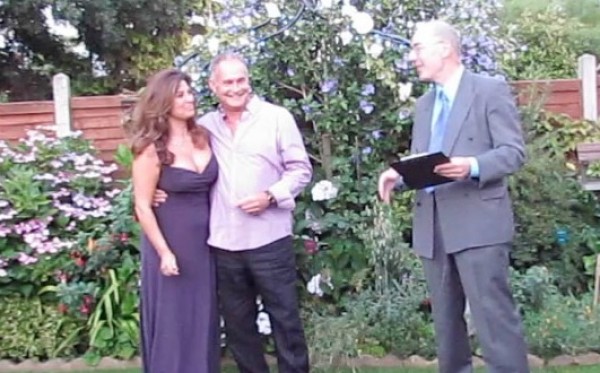
by Michael | Feb 8, 2016 | Blog
You may have seen my recent blog about sample wedding and handfasting ceremonies. (Thanks for showing up again, then!) I promised also to show you some typical ceremonies that I might offer for Vow Renewals and Funerals. I shall be true to my word, as I hope you’d expect.
I’m a Civil Celebrant, so I create and conduct tailor-made ceremonies. That means that there’s no such thing as “typical”, actually. And I’m not now taking into account whether you want religious or humanist, or something in between! Nonetheless, I trust this will give you at least a flavour of what you might expect.
Vow Renewals
RING BLESSING
Rings are symbolic of the completed bond. The ring is without a beginning or end the ring goes on forever.
Circles of life, circles of love, these rings are given and received as a token of continuous never- ending love and devotion. They are an outward symbol of your inward promise that each of you have made to one another.
D., take C.’s hand… touch the ring that you have given to your Bride as the lasting symbol of your love.
Repeat after me, D: C., with this ring, I promise to continue to grow with you, to build our love, to speak openly and honestly, to listen to you, and to love and cherish you now and forever. This ring serves as the pledge of my love and as the symbol of our unity.
C., take D.’s hand… touch the ring that you have given to your Groom as the lasting symbol of your love.
Repeat after me, C.: D., with this ring, I promise to continue to grow with you, to build our love, to speak openly and honestly, to listen to you, and to love and cherish you now and forever. This ring serves as the pledge of my love and as the symbol of our unity.
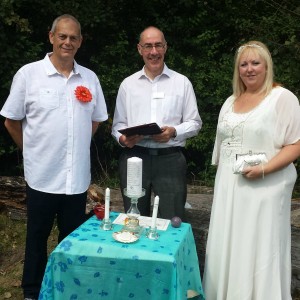
UNITY CANDLE
“This Unity Candle is a symbol of the marriage, representing the two becoming one
Having recited their vows, the couple will now light each of the individual candles and jointly light the Unity Candle as a symbol of their recommitment to each other.
As C. and D. light the Unity Candle from their individual candles, they combine their own flames into one. As each candle may light another without diminishing its own light, so may two join together without diminishing each other. Marriage is a partnership where each may give of themselves, without losing that which makes each one unique.”
Funerals
Introductory
(Name’s) earthly journey has ended (too soon) and yet we know that all that lives must die. Nothing prepares us for days like today because we are never ready to lose someone we love.
Grief is ultimately the price we pay for love. You know that the light of the most distant star continues to reach the earth long after the star itself has gone out, so (name’s) light and love will continue to shine in your hearts. This light never goes out because love lives in our hearts and love never dies.
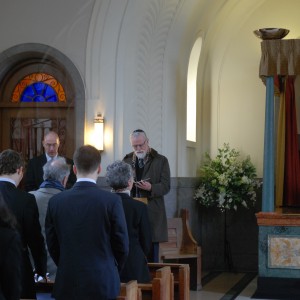
Reading
But although we mourn a life that has ended prematurely, we are mourning a full life. Wherever a life finishes, there it is complete. Its value lies not in its length but in the use that is made of it. A person may live into extreme old age, and yet have lived very little. It was Abraham Lincoln who said “It’s not the years in your life that count, but the life in your years.” There was certainly plenty of life in (name’s) years and we only have to look around this chapel to see the impact that he/she had on so many people.
And it’s important that our recollections of him/her, even today, are not unduly coloured by the deep sadness we feel at this time. Of course we shall grieve, of course we can’t avoid the sense of injustice, that one we cared about should have been snatched from us. But we owe it to (name’s) memory and everything he/she meant to us to honour and celebrate his/her life, to focus on the positive reminiscences, to recapture some of those things that made him/her the unique and special person he/she was, and to smile as we remember him/her. The character, humour and individuality that were so much a feature of (name’s) life will live on in the memories of friends and family much longer than the acute sadness we are feeling at his/her passing.
Poem
Vanished Stars
There are stars up above,
So far away we only see their light
Long, long after the star itself is gone.
And so it is with people that we loved –
Their memories keep shining ever brightly
Though their time with us is done.
But the stars that light up the darkest night,
These are the lights that guide us.
As we live our days, these are the ways we remember.
Hannah Senesh
So just an idea, perhaps, of what we can put together for you. If you would like to find out more, please contact me on 07931 538487 or at celebrant@vowsthatwow.co.uk. I look forward to being able to help you further.
by Michael | Jan 7, 2016 | Blog
Mature marriage is in no way rare these days, even if most people still tend to think of a wedding as a “young person’s thing”.
Why marry when older?
In many cases, people are choosing to put off their wedding longer so that they can enjoy themselves before being encumbered by a family. They may want to establish a business or career, and need to devote their time to this.
Some people believe they shouldn’t marry until they are ‘sure’ that the relationship has a good chance of lasting. They may lack confidence.
Older people are returning to the marriage market for another go. They may be divorcees or widows/widowers.
Gay couples in a civil partnership are increasingly looking to convert their legal status to marriage, and many established pairs are therefore taking advantage.
Should the ceremony be different?
A church wedding (if permitted) and, indeed, a register office ceremony, will be the same for an 18-year-old or for a 58-year-old. They are basically standard ceremonies.
If you’re looking for a bespoke ceremony, you will need a civil ceremony.
Civil Ceremony suggestions
By the nature of the thing, no two civil ceremonies are likely to be the same, so it is impossible to be prescriptive.
Nevertheless, when approached by more mature couples, I still have the preliminary chat and establish what elements (if any) they have in mind. I make suggestions and then, over time, send them drafts for them to approve.
The areas I am likely to cover include music, rituals and readings.
- There is no reason why older couples can’t enjoy the same sort of music as youngsters (if that’s their choice). They may choose the same rituals (a Unity Candle is always lovely – but older pairs may have families they want to involve, so this ritual can be expanded to include offspring etc.). Either age group may decide to include the offering of a gift, such as a red rose, to their parents during the marriage.
A good celebrant ought be able to supply suitable suggestions.
Of course, some rituals (such as ‘jumping the broom’) may be less advisable for more mature couples!
- There’s no reason why age should prevent couples from writing and/or reciting their vows or having the rings blessed.
- Readings can be whatever the couple want, and many are not age-specific in any way. However, some are suitable for more mature couples. I like this anonymous passage (for very mature couples!), and I conclude with it:
“The question is asked: ‘Is there anything more beautiful in life than a young couple clasping hands and pure hearts in the path of marriage? Can there be anything more beautiful than young love?’ And the answer is given: ‘Yes, there is a more beautiful thing. It is the spectacle of an old man and an old woman finishing their journey together on that path. Their hands are gnarled but still clasped; their faces are seamed but still radiant; their hearts are physically bowed and tired but still strong with love and devotion. Yes, there is a more beautiful thing than young love. Old love.’
by Michael | Jan 7, 2016 | Blog
Wedding day “butterflies” are to be expected. However, they can easily turn into terror.
The bride will be the centre of attention of all the people in her life that matter. The groom will have to speak in public. According to statistics, many people claim they would rather die than engage in public speaking.
Actually, most people involved in a wedding are likely to be afflicted by some sort of attack of wedding day nerves. A bit of adrenalin is good, but more extreme effects can include near-paralysis, mood-swings, depression and plain despair.
That’s less than ideal on a wedding day.
Why the nerves?
Nerves can surface because you fear your role or because you believe everything will go wrong.
One way to reassure yourself is to choose reliable suppliers, do everything as far in advance as is reasonably possible and re-confirm in reasonably good time. If you’ve planned sensibly, there should be no need for pessimism.
As for roles, every ceremony will be different, so there can be no one-size-fits-all approach, but I offer the following nuggets.
General remarks
- Whatever your job is – whether or not it needs a list – you must have ensured well in advance that you understand what is expected of you. If your tasks involve planning, do check in good time that everything is as ready as possible.
- Arrive in good time on the day – allowing for traffic delays and the like.
- Try and be as relaxed as possible. If things go wrong – and small things often will – they can often be remedied thanks to no more than a cool head and goodwill. Most people will be understanding, helpful, supportive and good-humoured at a wedding. They have come to participate in a great day, and will want it to succeed as much as you do.
- If you are getting stressed, though, stop and take half a dozen deep breaths and get back in control.
- Alcohol is not a great idea (well, not until you have completed your particular role).
Parents
The bride’s father may have a speech to make, but this only needs to be short and simple. It can be read from a card, if necessary (although preferably not verbatim). Nobody has demanding expectations of him, so he only really needs to smile and speak slowly and clearly, and thank everyone.
Otherwise, parents’ participation in the ceremony may include walking the bride up the aisle, perhaps, but there will be nothing unexpected or trying. Moreover, the celebrant will be in charge then, and can guide you, if needed.
The money’s been spent – there’s nothing more you can do. Don’t criticise or fault-find. Relax and enjoy the special day!
Best Man
This role differs enormously from ceremony to ceremony. It usually involves holding and handing over the wedding ring, when requested. A good tip is to put the ring on your little finger until needed – but don’t put it over your knuckle! Your role may entail guiding the groom at every stage; it may even involve being a kind of master-of-ceremonies and photo-shoot organiser.
It will surely involve giving a speech. May I refer you to a previous blog, which covers this at some length.
Ushers, bridesmaids etc.
In most cases, you have been given an honorary position, so you have a limited (but important) role. The bridesmaids are there to support the bride and – to be honest – to look pretty. The ushers will need to help get people in to (and possibly out of) the ceremony venue. There may be other jobs later, but there is no need to be nervous. Smart, punctual and charming are the watchwords here. Enjoy.
Groom
The groom’s job is to remember the ring, be early and welcome people as they arrive (which should be enjoyable, as almost everybody will greet you with a big smile – and being nervous isn’t going to help you socialise!).
You don’t have to do much at the ceremony – the celebrant will prompt you. You will have to put the ring on the bride’s finger and you may need to recite the vows. (You can learn them off by heart, but much less stressful would be to use notes or read them from a 3 x 5 card – or even repeat them after the celebrant.)
The ceremony will whizz past and then it’s normally a question of signing the register (not too arduous!), the photos and eventually cutting the cake.
The only thing I have not yet mentioned is your speech. So do, please, cast an eye over my blog on the subject.
Bride
Ordinarily, the bride shows up (not late, please!) a few minutes before ‘kick-off’. Her job is to be admired, – a beautiful dress and a lovely smile will go far. Sure, she will be the centre of attention, but she will be on a cloud of goodwill, so she needn’t be apprehensive.
Just remember that everybody is rooting for you all, and thousands of people have done what you are doing and survived. And some have even enjoyed themselves!
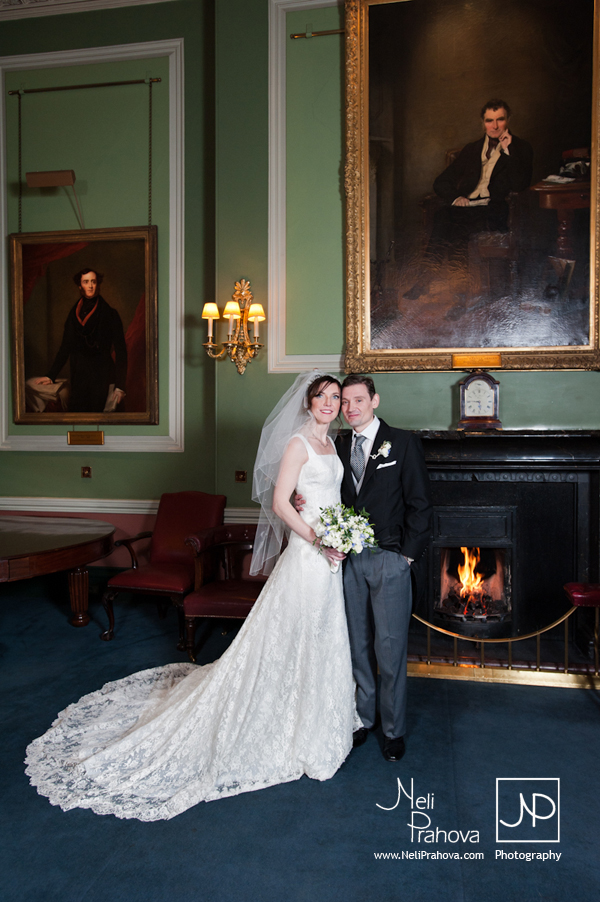
by Michael | Jan 6, 2016 | Blog
As a celebrant, most of the ceremonies I conduct are reasonably conventional (although all are unique – specific to the couples or individuals concerned, because I specialise in tailor-made ceremonies).
Every so often I get asked for something a bit more way out.
Of course, “way out” means one thing to some people and something quite different to others. So perhaps it would be easier if I defined what I had in mind by the term “conventional”.
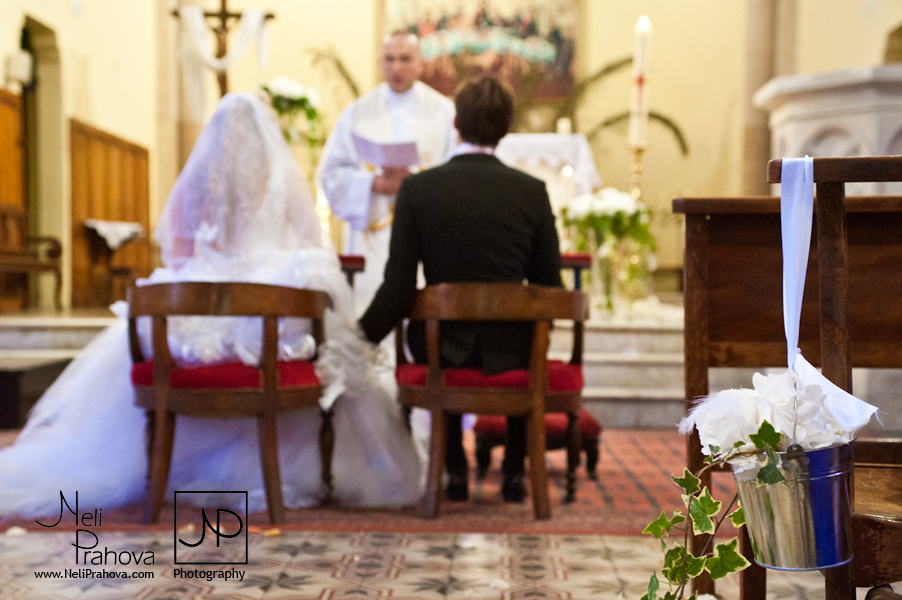
Conventional
A “conventional” wedding will contain most, if not all, of the following:
- an introduction or welcome;
- readings, sometimes delivered by friends or family – these can be prose or poetry, and can be chosen specially by the couple or suggested by the celebrant;
- music – this is unlikely to be “traditional” – although there’s nothing to stop people throwing in a hymn or the like. It may well reflect the couple’s personal preferences or a significant moment in their relationship;
- the vows – these may be written by the couple (with or without celebrant input) or simply suggested by the celebrant. They may be memorised or (more advisable!) read from a card or repeated after the celebrant;
- a ring blessing;
- a celebrant address – this may be something on the importance of marriage combined with the couple’s ‘story’ ;
- maybe, a ritual or two – for example, lighting a unity candle.
Such weddings may feature the bride in white; several, many or no religious elements; and a variety of choices of music and texts.
Venues can be just as varied, of course. Provided the legal part of the wedding has taken place (ie before registrars), imagination or budget would seem to be the main limitations as to where you hold the ceremony.
More ‘way out’
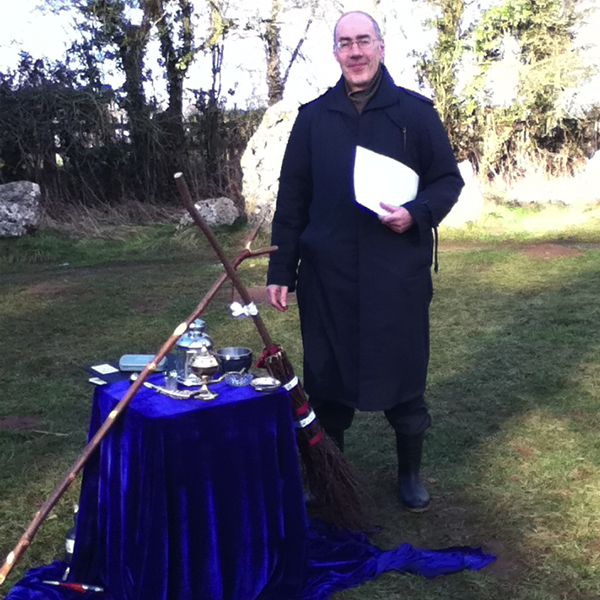
However, I am occasionally asked to do a couple of less middle-of-the-road ceremonies. One was a naturist wedding (I’m afraid, I have no photographs!) and another, a pagan wedding with a difference.
This wasn’t an ‘ordinary’ pagan wedding – if any can be thus termed – as the pagan was marrying a (half!) Jew, so elements from both cultures had to be combined (and explained to guests).
It was a handfasting ceremony, so that also set this apart.
The venue was certainly striking, as we were on top of Old Sarum, near Salisbury. This was of particular significance, because this iron age fort is very exposed, as the photo above shows, and the chances of a dry wedding were very poor. However, whether it was due to the combination of cultures, or mere coincidence, the sun actually shone (briefly) on the ceremony, and we were all able to enjoy the most wonderful experience.
Be bold!
So you have choices. Weigh them up and decide wisely. Bear in mind that a personalised wedding can be so special. Do give it consideration!
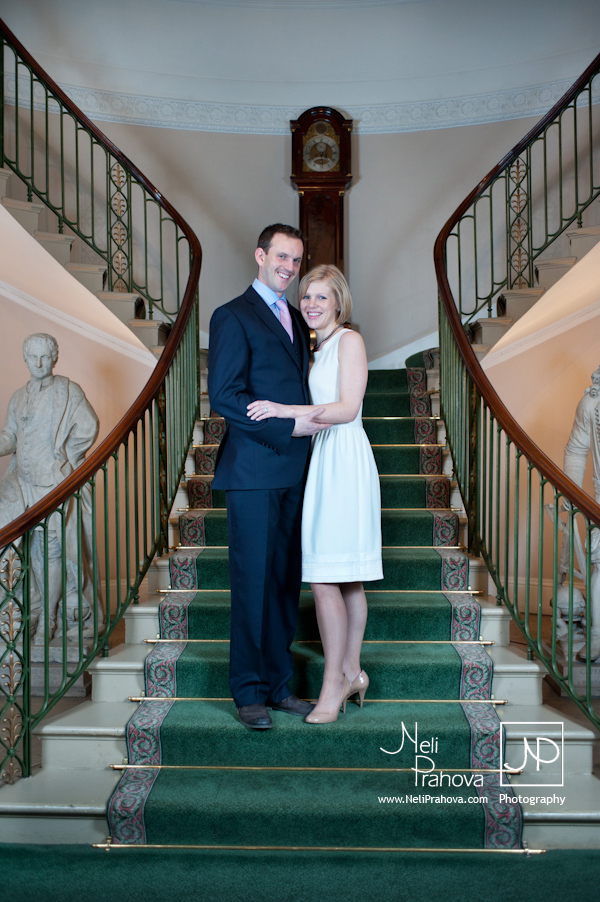
by Michael | Dec 30, 2015 | Blog
Most of us would agree that preparing for a wedding should have a government health warning attached! So how can marriage be good for your health? Surely that start to married life must be one of the most stressful things you’re going to encounter.
Until you have children. Or your marriage hits the rocks. Or someone close to you dies. Get the picture?
Well, I don’t suppose you’ll believe it, but, according to recent research, marriage may actually benefit your health.
[And that refers to women, as well as to men, by the way!]
A surprising fact
Studies have shown that people who are widowed, divorced/separated or unmarried are likely to die earlier than married people.
So why should this be?
Possible Explanations
There can be no single reason, and there may also be some very particular reasons – thus a rich couple may live longer simply because they are able to afford better health provision.
Wealth
Talking of wealth, you can justifiably claim that the acquisition of wealth may well entail great stress (depending on how you acquire it!), but the reverse is also true: if both of you are earning a reasonable income, you are likely to be more relaxed and at ease. After all, finances are a major cause of stress. There is evidence that suggests that married men are likely to earn 40% more money than single men and security is a great stress-reliever.
Employment
Job security is another factor – and the fact that you are married can indicate trustworthiness and security to your employer, which can improve your prospects – and put you ahead of otherwise comparable competition at a job interview.
Health and Safety
As far as health is concerned, being part of a committed married couple reduces your risk of contracting sexually-transmitted diseases.
Couples tend to watch out for each other’s health and can often identify potential problems before they become serious. They may also encourage (nag?!) the other to have a “minor” issue checked out.
Married couples also appear to be less likely to get involved in potentially violent disputes between others. Moreover, single/divorced women are far more likely to be victims of violence than married women. Likewise, unmarried men are also at greater risk of violent crime than married men.
Solitude and Intimacy
According to evidence that must surely be a little anecdotal (!), considerably more married couples engage in sex each week as opposed to single or cohabiting individuals. This has health benefits (not just because exercise is praiseworthy), as sex releases endorphins that improve mood and can reduce stress (and encourage more of the same).
Mental issues
Various studies indicate that married men or women are far less likely to commit suicide than their single counterparts, and the same goes for indulging in alcohol and illegal drugs. In fact, an international study has found that married people are likely to be significantly happier than unmarried ones. (I don’t know how they quantify happiness, but these studies appear to have been carried out scientifically.)
Conclusion
Of course, there are unsuccessful marriages (the divorce rate alone indicates that) and, as I have said, some of the so-called evidence seems hard to demonstrate as hard fact, but there is enough here to convince me that I am doing the right thing as a civil celebrant by helping people get married! I gather that there are some massive fringe benefits for my couples!







